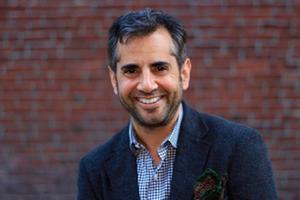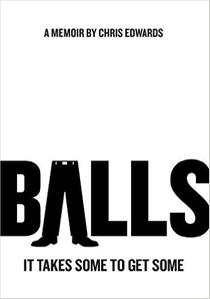
|
|
| photo: Scott Lush | |
After a career in advertising that spanned nearly 20 years, Chris Edwards left his post as executive v-p, group creative director, at Arnold Worldwide to write his memoir, Balls: It Takes Some to Get Some (Greenleaf Book Group, October 4), about his transgender journey.
You are a brave man. How did you get that way?
Oh, thank you for saying so! You know, when I announced my transition at work, a lot of guys at the office told me I had bigger balls than they did--that was the inspiration for the title. I guess when you're so miserable you want to end your life but you can't bring yourself to do it, you have no choice but to be brave and change it. But I can't take all the credit. It's a lot easier to be brave when you have the support of family and friends. If I hadn't had that, I don't know if I'd be here today.
As part of your transition, you had to deal with many changes and obstacles such as puberty (again!), years of surgery and laser hair removal, embarrassing incidents. Did you have any idea what you were in for?
When my endocrinologist started me on testosterone, he told me I'd go through all the things that come with male puberty. But I didn't know what that meant really.... I didn't have any brothers to watch go through it and most of my friends were girls. There were physical changes I was informed about, like deepening voice, muscle mass/weight gain, hair growth (everywhere!), male pattern baldness (thank god for Propecia), and acne worse than I ever had during female puberty (humiliating to be age 26 and at CVS fighting the 8th graders for the last tube of Oxy 10). And I never would've thought I'd need to remove hair on my forearm in preparation for "bottom surgery"--or worse, that it would take four years of laser and electrolysis to do it.
When it came to surgery... after consulting doctors I knew it was going to be a long process with multiple surgeries and a high risk of complications, but I had no idea specifically what kind of toll it would take on my body. And honestly, I didn't want to know. My doctor told me six surgeries over two years, so I was mentally prepared for that. But due to complications, it turned into 22 surgeries over five years. Had I known that going in, it would've been a lot scarier and harder to go through. I still would have done it, though. I knew it's what I had to do for me to feel complete. And that feeling trumps everything.
Did you keep a journal through all of this? When did you start?
I actually didn't keep a "journal journal" like a diary if that's what you mean. Only girls do that ;). But I did keep letters, documents and my day planners. Then when I started bottom surgery, I kept a medical journal documenting all the surgeries and recovery notes. Photos, too. There are some doozies!
 You write, "What makes someone a man inside? What makes someone a woman?" How do you articulate your essence?
You write, "What makes someone a man inside? What makes someone a woman?" How do you articulate your essence?
This was really really hard to articulate. I think deep down you "just know" and you never really question your gender unless it doesn't match your physical body. It's why people who are not transgender have so much trouble understanding it. I've known since I was four or five that I was a boy. Back then I thought the only difference between boys and girls was that girls had long hair and boys had short hair. So I got my haircut "like Daddy's" and I thought my problem was solved. Ha! If only it were that easy.
"The key to understanding gender dysphoria is realizing that sexual orientation and gender identity are two totally different and separate things." Can you expand on that?
A lot of people think being transgender is an extreme form of being gay. The fact is, sexual orientation has nothing to do with gender identity. I didn't even realize this until I met a transgender guy who was also gay. As a woman he was attracted to men. Now that he's a man he is still attracted to men. His transition didn't change his sexual orientation. One way to understand it is sexual orientation is who you go to bed with. Gender identity is who you go to bed as.
Judging from the responses of your friends, you are a good friend. And your family is incredibly supportive. What do you say to people who don't have this kind of support?
I was very lucky to have the support I had and still have. And I know there are many transgender people out there who aren't so lucky. What is most alarming to me, and a big reason why I wrote this book, is that the suicide attempt rate for transgender kids is 51%. And this is largely due to lack of support at home. I feel if there were more "everyday" success stories like mine out there, parents could look at those examples and say, "Well, those people did it and they turned out okay, my child will be fine." It's great that celebrities like Caitlyn Jenner are spreading awareness and opening the conversation to a mainstream audience, but it's hard for a parent to be reassured that their child will be fine, because celebrity life is not relatable. So really my message to parents and family members would be to please be more understanding and give your loved one the chance to live a full and happy life. And for the trans kids and adults who are feeling alone, I would say, surround yourself with positive people. Find support groups. There are so many resources out there that I didn't have back in the mid '90s when I went through this. One of them is Camp Aranu'tiq, a nonprofit program providing trans kids age 8-18 and their families with support that is so critical at that age. I'm donating a portion of proceeds from my book sales to their organization.
You never wanted to be a poster boy for the transgender movement, and yet, here you are. How is it?
Honestly, it's been hard for me. My main goal when I set out on this journey was never to let my transition define me. It was something I wanted to just get through so I could be the man I always knew myself to be. I did that, and when asked to check a box, I check "male," not "transgender." But in the four years it's taken me to write and publish Balls, my transition has been defining me. And I've been struggling with it. I'm not ashamed--I consider it part of my gender history, but it's not something I want out on the table in the first 10 minutes of a date, if you know what I mean. I want people to see me for me. I am so many other things: a creative director, speaker, son, brother, uncle, lover of yellow grocery store birthday cakes with buttercream frosting.... That said, I have no regrets. I know this book will change perceptions and help a lot of people. My only regret would have been not writing it.

